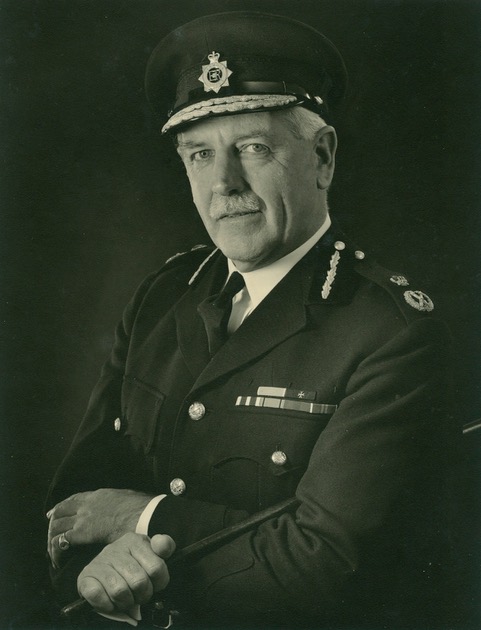
George Herbert Robins, MBE, CBE, KPM, OStJ, CPM, served as Commissioner of Police here in Bermuda from April 1961 to November 1969, following his initial appointment as Deputy Commissioner as of 1st May 1960. Prior to his arrival here in Bermuda Mr. Robins had served as a Colonial police officer since 1930 when he was appointed as an Assistant Superintendent in Ceylon. He was promoted to Superintendent in 1943 at which time he was in charge of the War Emergency Department in Colombo. He served in Ceylon for 18 years, and in 1948 he was appointed as a Senior Superintendent in Tanganyika (now Tanzania).
From 1950 - 1952 Mr. Robins served as the Director of Colonial Police studies at the Police College in Coventry, England, prior to returning to Tanganyika for 2 years as Assistant Police Commissioner. Mr. Robins returned to Cyprus as Commissioner of Police from 1954 – 1957, prior to being appointed Acting Police Commissioner in Nigeria until early 1960.
Having had a distinguished career in the Colonial Police, Mr. Robins was selected by the Secretary of State for the Colonies as Deputy Commissioner of Police in Bermuda to replace Deputy Commissioner, Mr. Maxwell B. Parker who was due to retire on 1st May 1960.
Bermuda experienced some of the most turbulent times in its history in the struggle for desegregation and equal voting rights during the late 1950’s and early 1960’s.
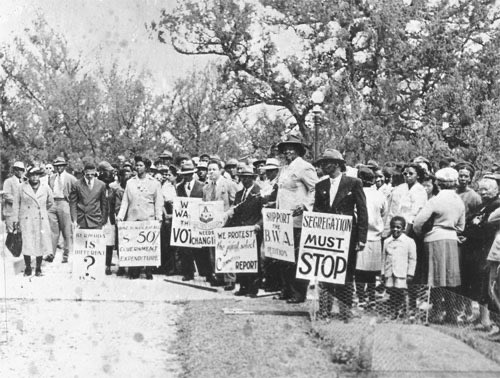
In June 1959, Bermuda’s six movie theatres were successfully boycotted by black Bermudians in a protest against segregated seating. Within a week the theatre owners announced an end to segregated seating. The Theatre boycott was a pivotal moment in the struggle for desegregation and racial equality at a time when blacks were still being denied entry into civil service jobs, post offices and banks, with black workers being paid less than white workers, and blatant segregation in hotels. It was the beginning of the end for segregation in not only theatres but also in restaurants and hotels.
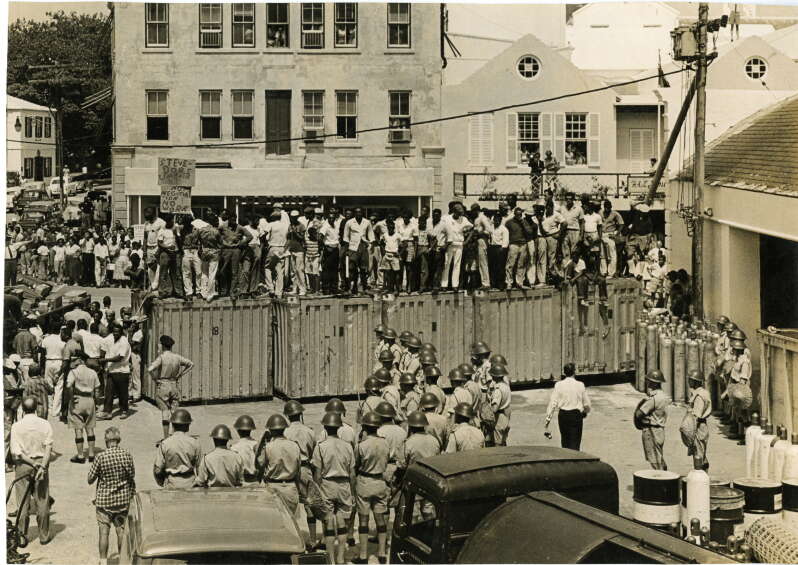 Dock Strike - September 1959
Dock Strike - September 1959
In September 1959, Bermuda experienced its first major industrial action when Hamilton’s dockworkers went on strike just 3 months after the equally momentous Theatre Boycott. Fortunately, after having the Riot Act being read by a magistrate from the balcony of a Front Street store, the dock workers and the gathered crowd peacefully dispersed.
The Police Force was responsible for law and order and officers were present to monitor both the Theatre boycott and the Dock strike. CLICK HERE for a first-hand description of the scene on Front Street by a young new constable, P.C. Mike Cherry, as the situation escalated to the point where a small handful of policemen, with no prior training, having been issued with ex-army tin helmets, wicker shields, and long wooden batons, marched down Front Street “to be met by an unruly mob of dockworkers supplemented by others all seemingly armed with an assortment of ugly weapons …. (including) nasty looking swords and pieces of rebar.” Fortunately, due to behind-the-scenes discussions, along with the efforts of longshoreman “Pork Chop” Mills, a physical confrontation was avoided but it was clear that the demands for justice and equal rights would continue and the police would need proper training in how to best handle future industrial actions.
During these difficult times only a small number of blacks were involved in elected political office due to the lack of voting rights for blacks, and it would be five more years before Bermuda finally had equal voting rights.
The Police Force had long had a problem recruiting Bermudians into the Police Force, and very few local officers were promoted above the rank of Sergeant. In fact Edward “Bosun” Swainson made history for the second time when he became the first black officer promoted to the rank of Inspector on 1st February 1949. “Bosun” had earlier made history for the first time when he scored the first century in Cup Match in 1937. CLICK HERE to view his lifestory in the “Hall of Fame” column of our ExPo website.
One of the major problems for black officers was the lack of any formal training for new recruits. For many years this comprised spending a few days in Hamilton Police Station studying law books and hand-written notes under the supervision of a senior officer. For example, when young Frederick “Penny” Bean joined the Police Force in 1956 his basic training included spending a week reading through law manuals under the direction of Inspector Jack “Tug” Wilson at Hamilton Police Station.
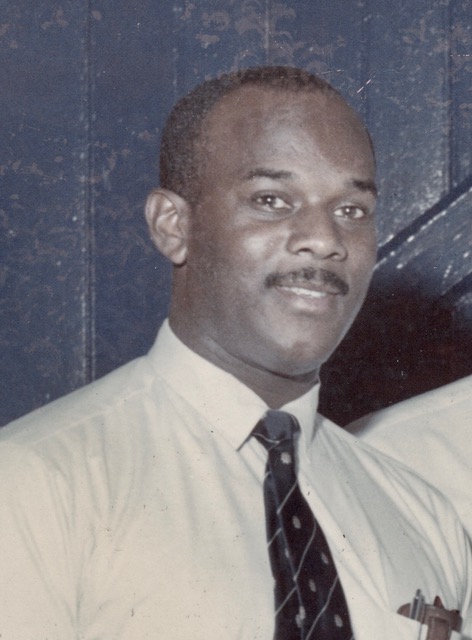 Young Frederick "Penny" Bean
Young Frederick "Penny" Bean
As the need for more police officers increased, the Force began to recruit officers in the 1950’s from the UK, either young men with previous police experience, or men who were usually ex-military men who had completed their National Service. The young men without previous police experience were required to attend a 3 month Basic Training Course at the Police Training School at Millmeece in Staffordshire prior to their arrival in Bermuda. This was in stark contrast to the training received by Bermudian recruits although by 1960 the Police Force was sending a few officers on specialized courses in the UK.
At about the time of Mr. Robins’ arrival in Bermuda in 1960, our tourism industry was rapidly expanding with more visitors arriving by air. Traffic on the Island’s roads was rapidly increasing with more motor vehicles, along with livery cycles being ridden by tourists, and illegal drugs were beginning to appear on Island.
Mr. Robins would have just over 12 months to acclimatize to the exigencies of police work here in Bermuda before being promoted to Commissioner of Police with effect from 2nd April 1961, a position he held for the next 8 years until his retirement in November 1969.
18 years after his retirement, Mr. Robins returned to Bermuda at the age of 77 on a short visit during which time he attended a social function held in his honour, hosted by Mr. Frederick “Penny” Bean, the young constable who had joined the Bermuda Police in 1956 and had received his “training” under the direction of then Inspector John “Tug” Wilson. However, by the time of Mr. Robins return, “Penny” Bean has risen through the ranks to become Commissioner of Police, a position he held for 10 years.
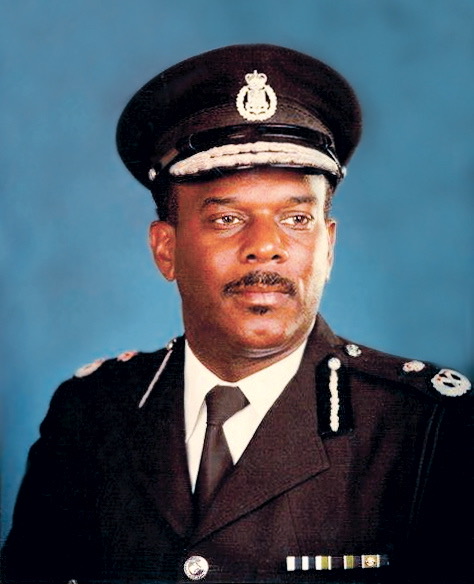 Commissioner of Police Frederick "Penny" Bean
Commissioner of Police Frederick "Penny" Bean
During a speech at the function held at the Hamilton Princess Hotel, Mr. Bean credited Mr Robins for laying, “the foundation of what we enjoy today as a first class Police Force.” Mr. Bean recalled that one of the many accomplishments of the former Commissioner was the establishment of the Narcotics Department – as it was then known”. Additionally he had increased Special Branch activities, insisted on two fully trained and qualified (Marine) launch crews, and started policing at the airport.”
“His primary task of Bermudianising the Force was no easy matter” Mr. Bean stressed. “However, he had a vision and persevered.”
Mr. Bean concluded by saying, “I am proud at being a part of that living testimony of his efforts and, if you glance around this room tonight, you will observe others who shared his experience. George Robins gave to us Bermudians a sense of pride and dignity. He showed that he cared, and providing that we were loyal, worked hard and applied our God given talents, the results would come.”
CLICK HERE for an article in the Police Magazine - Winter 1987 (page 17) about the visit by Mr. Robins.
As a means of recognizing the difficulties and hurdles faced by Mr. Robins during his tenure as Commissioner of Police here in Bermuda, we are publishing a series of articles compiled by retired Superintendent George Rose who has conducted extensive research through local and international newspapers, House of Assembly records, and our own Police Magazines, to piece together the record of Mr. Robins’ 9 years in Bermuda, first as Deputy Commissioner, and then as our Commissioner of Police.
CLICK HERE for the first article in this series.